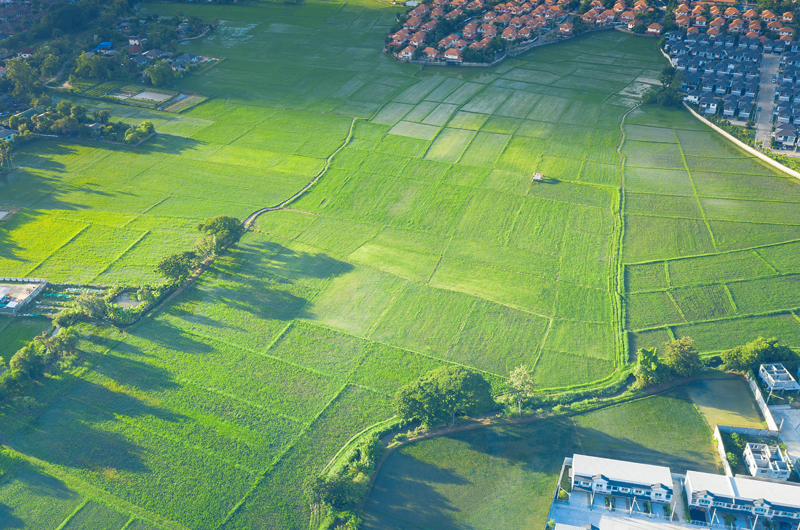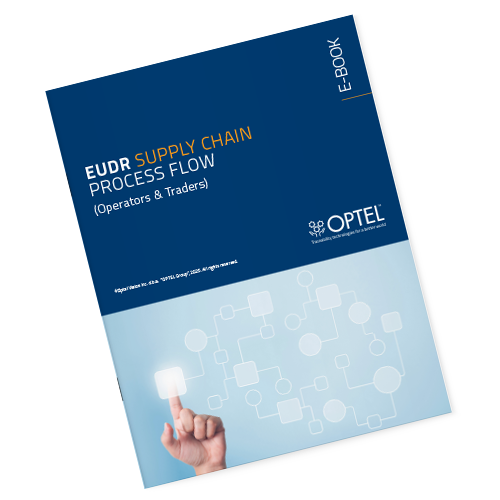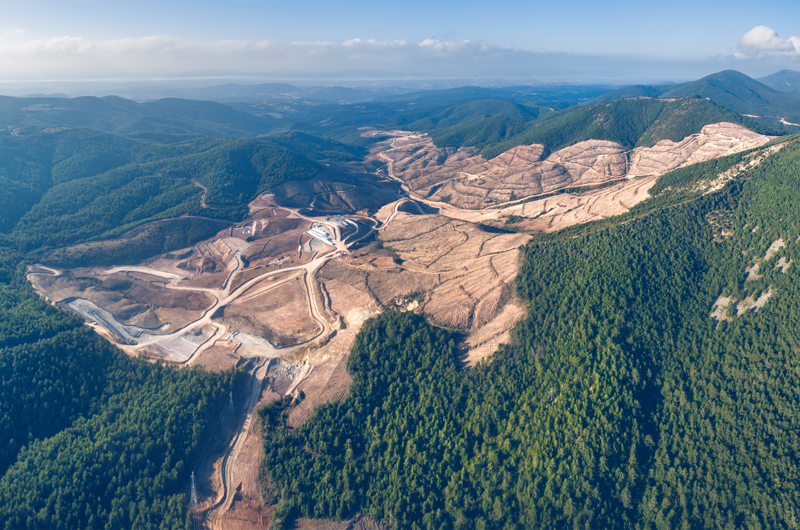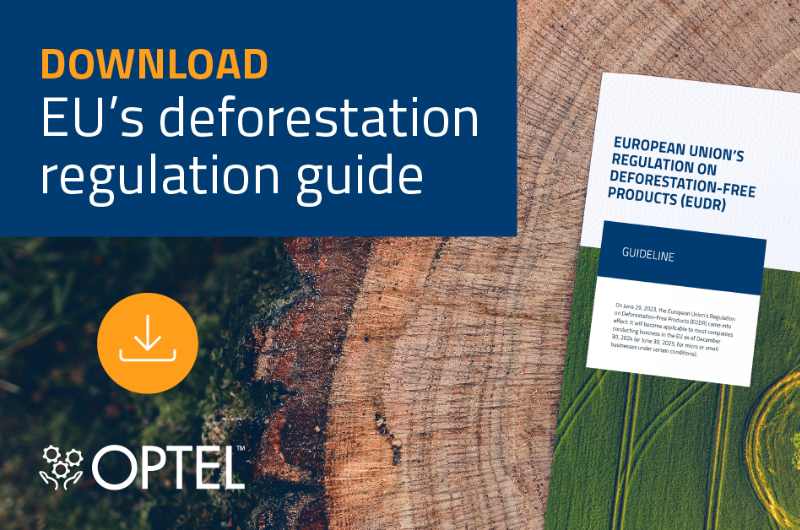
EUDR INSIGHTS AND ITS IMPLICATIONS FOR BUSINESSES AROUND THE WORLD
On June 29, 2023, the European Union’s Regulation on Deforestation-Free Products (EUDR) came into effect and will become applicable to most companies conducting business in the EU as of December 30, 2024 (or June 30, 2025, for micro or small businesses under certain conditions).
This timeline gives companies and regulatory bodies in both producer and consumer countries a short window to comply with the regulation.
Let’s look into the EUDR and its implications for businesses around the world.
WHAT IS THE EUDR?
The EUDR marks a critical step toward ending deforestation by 2030. Enacted to stop the rapid depletion of forested areas worldwide, the EU aims to ensure that consumer goods, such as soy, coffee, cocoa, wood, rubber, beef, and palm oil, entering the European market do not contribute to global deforestation. By targeting these key commodities responsible for 80% of forest loss, the EU wants to be the leader in fighting deforestation. In practice, this means that any product manufactured using land deforested after the year 2020 will not be allowed on the EU market.
With the EUDR, companies will need to conduct comprehensive due diligence to verify the origins of their imported or exported products, proving they have not contributed to deforestation or the degradation of natural ecosystems. The regulation will also address the social impact of deforestation, such as the exploitation of indigenous peoples and local communities.
Inevitably, the EUDR also has significant geopolitical implications. Whether a country is a member of the EU or located in another part of the world, it will receive a standard risk classification list from the EU that will categorize countries based on their risk level for deforestation-linked commodities and products.
What are the EUDR’s specific due diligence requirements?
To ensure compliance, companies will have to carry out a multi-step due diligence process: data collection, risk assessment, and risk mitigation.
- EUDR DATA COLLECTION
At the data collection phase, businesses must acquire real-time information about their products. This includes everything from basic product descriptions and quantities to more in-depth details, like the geolocation of the farm or forest from which the product originates. Companies must also acquire conclusive evidence verifying that the product’s production is free from deforestation and adheres to the laws of the country of origin.
- EUDR RISK ASSESSMENT
Once companies have completed the data collection, they must undertake a risk assessment. Risk levels are determined by various factors, such as the presence of forests and deforestation, conflicts over land rights with indigenous communities, mixing and circumvention, supply chain complexity, and even socio-political aspects, including corruption and lack of transparency. This comprehensive analysis must be updated at least annually, serving as a living document that evolves based on ever-changing circumstances.
- EUDR RISK MITIGATION
If the risk assessment concludes there is zero risk, no further action is required. However, if risks are identified, companies must explore risk mitigation measures. This could involve collecting additional data, carrying out independent surveys, or undergoing audits. This process is subject to regular audits to monitor the effectiveness of the company’s risk management policies. The EUDR also introduces the concept of “reasonable doubt.” If there’s even the smallest uncertainty about the origins of a product or commodity, businesses will be obligated to conduct a comprehensive risk assessment.

EUDR SUPPLY CHAIN PROCESS FLOW
E-BOOK
GEOGRAPHICAL COORDINATES OF THE PLOTS OF LAND ARE MANDATORY UNDER THE EUDR
To prove that commodities are not linked to deforestation, the EUDR mandates the ability to trace products back to the exact pieces of land where they originated. This is achieved by using geographic data, which can include satellite images or on-site photos with location tags and time stamps, to verify the connection between products and specific land plots.
Operators and traders must include these geolocation coordinates in the due dilligence statements before placing products on the market or exporting them. This requirement is a core part of the EUDR, prohibiting the sale or export of targeted commodities without submitted geolocation coordinates.

HOW OPTEL’S END-TO-END TRACEABILITY SOLUTIONS ARE GAME-CHANGERS FOR EUDR COMPLIANCE
OPTEL’s OptchainTM end-to-end supply chain traceability platform is a next-generation solution that can help businesses navigate the complexities of the EUDR. The platform can track the journey of commodities from cradle to grave, enabling companies to efficiently adhere to the EUDR regulation’s due diligence requirements and facilitate reporting on supply chain deforestation.
What sets OptchainTM apart is that it is an all-in-one platform; it can be configured for all types of ESG compliance regulations and/or frameworks—not just the EUDR. OPTEL’s methods in field-based interventions and stakeholder engagement are designed to trigger direct action and communication where it’s most needed—right at the source.
OptchainTM captures data directly from the field in real time, consolidating the information from disparate sources to provide a comprehensive view of each supply chain, regardless of the number of actors and complexity. Moreover, OPTEL’s platform is both interoperable and scalable, making it adaptable to evolving business needs and third-party systems. One of its standout features is the granularity of its traceability: commodities can be directly linked to the specific plot of land from which they originated. An alert mechanism notifies businesses of any forest encroachment activities in their sourcing areas, facilitating swift action.
HOW TO BETTER PREPARE FOR EUDR COMPLIANCE
Given the intricate nature of global supply chains and the broad scope of the EUDR’s due compliance can be challenging. However, the pathway to compliance can be strategically mapped out through a series of key phases:
- CONDUCT AN INTERNAL EVALUATION: Begin with a complete review of your current supply chains. Pinpoint the products that could potentially be linked to deforestation, tracing them back to their countries of origin.
- ASSESS SUPPLIER COMPLIANCE; Don’t stop at your own operations; extend your review to include the compliance measures of your suppliers. You want to make sure your compliance initiatives are aligned with those of your trading partners.
- PLAN FOR DUE DILIGENCE TRAINING: Train your teams to carry out ongoing EUDR due diligence. You may consider appointing a dedicated compliance officer to oversee and manage these responsibilities.
- IMPLEMENT A TRACEABILITY PLATFORM: Integrating a traceability platform is a must. It will allow your teams to more easily capture and consolidate critical data, automate risk assessments, and enable real-time tracking of products back to their point of origin. Always make sure that your traceability platform vendor has a team of specialists who thoroughly understand each regulation your organization must comply with. You don’t want simply a technology supplier. You want a partner who brings both sophisticated technology and regulatory know-how to the table.
- FOCUS ON CONTINUOUS IMPROVEMENT: Compliance is an ongoing process. Regularly update your risk assessments and keep an eye out for changes in regulations or new information that could impact your supply chain.
WANT TO LEARN MORE ABOUT COMPLIANCE WITH THE EUROPEAN UNION’S DEFORESTATION REGULATION (EUDR)?
YOU MAY ALSO BE INTERESTED IN READING:

Understanding the EU Taxonomy: a New Era for Sustainable Investments
The EU Taxonomy is a classification system, which outlines a framework for what can be considered an environmentally sustainable economic activity. Its goal is to guide investors, companies, etc. toward environmentally friendly investments.

EU Corporate Sustainability Reporting Directive
The Corporate Sustainability Reporting Directive (CSRD) was published in the the Official Journal of the European Union on December 16, 2022. It requires certain companies to provide reports on sustainability-related matters, in line with a set of standards.

OPTCHAIN FOR EUDR COMPLIANCE
Optchain’s EUDR software links commodities to their production plots using data capture tools tailored to your supply chain, operations and processes.

